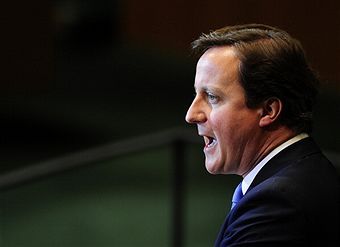 There are still rumours in Westminster that David Cameron will cut taxes to stimulate
the economy, but the speech he gave to the Canadian parliament on Thursday rather
scotches this idea. Here’s what jumped out at me
There are still rumours in Westminster that David Cameron will cut taxes to stimulate
the economy, but the speech he gave to the Canadian parliament on Thursday rather
scotches this idea. Here’s what jumped out at me
1) No Obama-style deficit-financed tax cuts, please, we’re British. “The economic situation is much more dangerous and the solution for most countries can not be simply to
borrow more. Because if the government doesn’t have the room to borrow more in order to cut taxes or increase spending, people and markets start worrying about whether a government can
actually pay back its debt. And when this happens confidence ebbs away and interest rates will rise, hitting people with mortgages, and hitting companies that want to borrow to invest.”
Britain “doesn’t have room” to borrow more in order to cut taxes, he says. Why not? Because we’re already borrowing as much as the markets will allow (runs his
logic) and if we ask for more then interest rates will rise. Here, he nods to what Allister Heath argued last
week: that we’re all still debt junkies, dependent on low rates, and could not stomach normal rates.
2) QE Ahoy? “Let me say again, it’s a debt crisis. Only when we properly recognise this can we begin to address banks which are too weak to pass on lower interest rates to
businesses and households.” This appears to be preparing the ground for QE. It’s true that British banks are not passing on all of the low interest rates to debtors, as they repair
their balance sheets: look at the below graph for spread on mortgages.

Yet still, Britain has no shortage of cheap debt: you can pick up a two-year mortgage deal for 2.7 per cent right now (details here) and the average cost of mortgages has collapsed:

So consumer debt is still – if anything – dangerously cheap. QE will make it even cheaper.
3) Tax cuts bring instability. “Yes, demand matters. But boosting it by undermining financial stability is self-defeating and damages the confidence on which economic growth
depends.” This appears to be a rejection of the JFK argument for deficit-funded tax cuts
– and an echo of the ‘stability before tax cuts’ line the 2005 leadership campaign.
4) Tax cuts don’t bring growth: “We should remember that in the long term it’s not fiscal policy that makes economies grow, it’s making us more productive
that’s essential for our future long-term prosperity.” Of course, ‘fiscal policy’ means tax and spending. Cameron says here that adjusting tax/spending does not impact
growth: a striking remark, albeit an unusual one for a Conservative to make. In the context of this speech, he’s rejecting deficit-financed cuts. I suspect that Cameron still believes tax
cuts are desirable, but that they are a luxury to be brought in after the budget is balanced in 2017 or later.
5) Deregulation, not tax cuts. “We are creating the most competitive corporate tax regime in the G20. Cutting the time it takes to set up a business. Reducing tax costs and
regulatory burdens for new businesses. And we have issued a “one-in-one-out” rule for regulation. So any Minister who wants to bring in a new regulation, will have to get rid of an
existing one first.” The above is not quite true. Osborne does want to lower corporation tax, but about two-thirds of that is being clawed back with other business taxes (such as
reducing capital allowances). And the ‘one-in-one-out’ clause has become a joke in Whitehall, because they have utterly failed to stem the flow of EU regulation into government –
as James Forsyth recently disclosed in his political column.
6) It’s the debt, stupid. “This is not a traditional, cyclical recession, it’s a debt crisis. When the fundamental problem is the level of debt and the fear of those
levels, then the usual economic prescriptions can not be applied.” Cameron is bracing himself for Ed Balls’ attack: he can’t do a ‘Plan B’ which involves more
debt, because debt is the problem. So he will boldly defy calls from left (more spending) and right (tax cuts) as he sticks to his middle way (the ‘Darling Plus’ deficit reduction plan,
soon to be washed down by £400bn of freshly-minted QE banknotes).
One final thing. Cameron also says: “In Britain, we have learnt from Canada’s own experience when you were able to take action to pay down debt.” If only. Canada’s
lesson was that no government department should be protected from cuts. “There was blood on the floor everywhere, but at least everyone could see that others were hurting too,” said
Marcel Massé, the minister responsible. Osborne made election-time promises not to cut health, which gobbles a quarter of all departmental spending, and the relentless increase in foreign
aid remains deeply controversial.
PS: The brilliant MustBeRead Twitter feed, which I’d urge CoffeeHousers to follow if they don’t already, summarises my post as predicting Cameron will rely on deregulation not tax cuts. I wouldn’t put it like that. If anything, they’re
relying on massive QE. I doubt they’ll get anywhere with deregulation. My understanding is that Osborne is cooking up some supply-side package. Whether it will amount to anything is another matter.







Comments